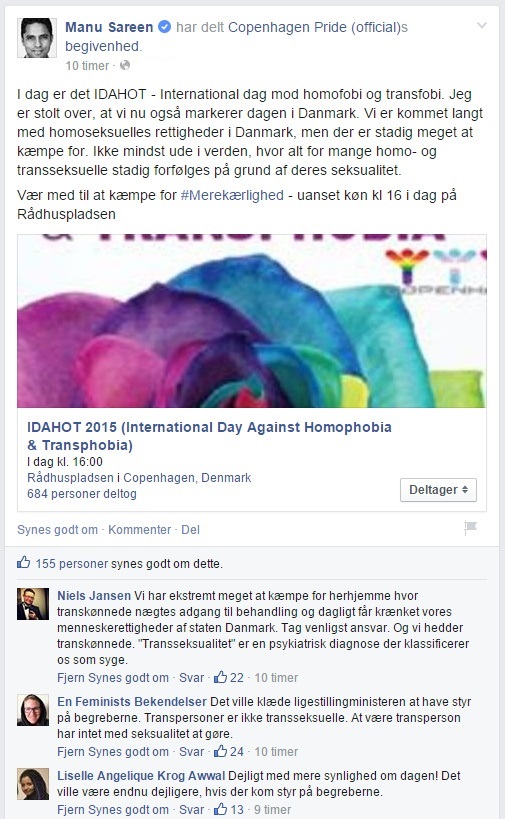Originally only cisgender speakers were invited to IDAHOT – The International Day Against Homophobia and Transphobia but two transpeople invited themselves up – with backing from the event’s planners, Copenhagen Pride.
There was reason to worry that the ‘T’ would once again be overlooked before the event even started even though it was recently added to the official title of the day. MP Manu Sareen posted the following on his facebook page:

Manu Sareen
Today is IDAHOT – International Day Against Homophobia and Transphobia. I am proud that we celebrate this day in Denmark. We have come a long way with homosexual rights in Denmark, but there is still a lot to battle for. Not least out in the world where too many homosexuals and transsexuals are still persecuted on the basis of their sexuality.
Come join as we fight for #Morelove – regardless of gender at 16 today at the town square.
Niels Jansen
We have plenty to fight for here at home where transgender people are denied access to treatment and daily denied our human rights from the Danish state. Please take responsibility. And we’re called transgender. ‘Transsexual’ is a psychiatric diagnosis that classifies us as sick.
Confessions of a Feminist
It would be great if the equality minister had a conceptual understanding of this topic. Transpeople aren’t transsexual. Being transgender has nothing to do with sexuality.
Liselle Angelique Krog Awwal
Lovely to have awareness about the day! It would be even nicer if you grasped the concepts.
The post was quickly criticized for generalizing all transgender people as transsexual although it’s just a small group of transgender people who define themselves as such. His miscategorization of transgender as a sexuality was also heavily critiqued. The text has since been changed and now reads ‘homo- and transgender’ instead of ‘homo- and transsexual’, but the misunderstanding that transgender has anything to do with sexuality hasn’t been addressed. This is not simply a verbal misunderstanding but represents a conception of transgender people that holds huge consequences. Since the state thinks being transgender is connected to sexuality, transgender individuals are forced to share intimate details of their sex lives with complete strangers at a clinic that lacks the skills to respond appropriately, which means they are not offered the treatment they need. The Sex Clinic does not have the competences to deal with transgender people or body dysphoria. The clinic works with sex-related problems and body dysphoria is not a sexual problem.
Mainstream media – for example TV2 – took note of the demonstration, but unfortunately didn’t mention transgender people or transphobia in the news headline, “25 years ago homosexuality was removed as a psychiatric diagnosis”, that aired on tv2.dk at 8:26.
The piece criticizes clinics in other countries that practice conversion therapy on homosexual people and discusses the resulting psychological damage. However, it completely ignores transgender people who are in the same situation even though Denmark has an institution – The Sex Clinic – that does just this to transgender people. It attempts to convince its patients that they are not in reality transgender, which means that more and more transgender people require treatment to repair the psychological damage the Sex Clinic inflicts upon them.
Manu Sareen was also a speaker at the town square event, and used his speaking time to remind us that homosexuals have it worse in other countries, and that we have a safe and nice life in Denmark while others risk being beaten or killed in places like Russia.
We were told that Denmark is good because we have marriages in churches, but that Manu Sareen can see that there is still homophobia in Denmark. Again, he didn’t mention transgender people.
Elvin and Magnild, who took to the stage to bring attention to transgender issues in Denmark, argued that we should resist pointing fingers at other countries and instead focus on sorting out our own problems. One simple problem to address before Denmark hosts IDAHOT next year could be to invite transgender speakers and bring attention to transphobia instead of focusing exclusively on homophobia on a day called the International Day Against Homophobia and Transphobia. In general we must do better at remembering that LGBT includes B for bisexual and T for transgender. Other countries have started to call the event the International Day Against Homophobia, Transphobia and Biphobia. Bisexuals have criticized the Danish arrangement for not keeping up with this development.
Read the speech here: Elvin and Magnild’s Speech at IDAHOT 2015 (in Danish)
To this day, hate crimes are committed in Denmark on the basis of gender nonconformity and sexuality. People are beaten in front of gay bars on Sudiestræde as the assailants chant homophobic jeers. We still hear stories of transgender people committing suicide after being denied treatment from the Sex Clinic. It is thus a major oversight on the part of the health minister to insinuate that violence and death are exclusively problems abroad.
On this day we celebrate that homosexuality was removed from WHO’s list of psychiatric diagnoses 25 years ago. Denmark can boast removing it from Health Ministry’s list of sickness 9 years earlier and setting an example for many other countries to follow. In the end so much pressure was put on WHO that it had no choice but to recognize that homosexuality is not an illness.
Meanwhile, transsexualism remains an illness according to the WHO and the Danish Health Ministry – a fact brought up by speaker Christian Vincent. Removing the diagnosis has been suggested in parliament many times but was rejected with the explanation that parliament would rather wait for the WHO to remove it first. Russia, known for its state-led homophobia and transphobia and lobbying that includes hampering HIV/AIDS initiatives is one of WHO’s financial backers. It is doubtful that WHO will be able to remove transsexualism without political pressure akin to what we saw that helped end the categorization of homosexuality as a psychiatric illness.
 dansk
dansk